Ditapis dengan
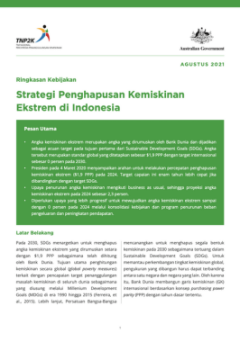
Ringkasan Kebijakan Strategi Penghapusan Kemiskinan Ekstrem di Indonesia
The rural economy makes a significant contribution to the national economy. At present, the impact of the Covid-19 pandemic is felt more in urban areas. Due to the high mobility of seasonal rural workers commuting between their home villages and cities, however, the impact on the rural economy needs to be anticipated promptly.
- Edisi
- 1
- ISBN/ISSN
- -
- Deskripsi Fisik
- PDF, 8 Halaman
- Judul Seri
- Policy Brief
- No. Panggil
- 362.5 ADJ.R
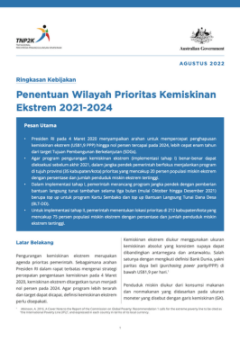
Penentuan Wilayah Prioritas Kemiskinan Ekstrem 2021-2024
The rural economy makes a significant contribution to the national economy. At present, the impact of the Covid-19 pandemic is felt more in urban areas. Due to the high mobility of seasonal rural workers commuting between their home villages and cities, however, the impact on the rural economy needs to be anticipated promptly.
- Edisi
- 1
- ISBN/ISSN
- -
- Deskripsi Fisik
- PDF, 20 Halaman
- Judul Seri
- Policy Brief
- No. Panggil
- 362.5 ADJ.P
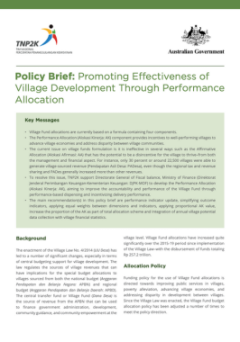
Policy Brief: Promoting Effectiveness of Village Development Through Performa…
The enactment of the Village Law No. 4/2014 (UU Desa) has led to a number of significant changes, especially in terms of central budgeting support for village development. The law regulates the sources of village revenues that can have implications for the special budget allocations to villages sourced from both the national budget (Anggaran Pendapatan dan Belanja Negara: APBN) and regional bud…
- Edisi
- 1
- ISBN/ISSN
- -
- Deskripsi Fisik
- PDF, 12 Halaman
- Judul Seri
- Policy Brief
- No. Panggil
- 352.54 ADJ.P
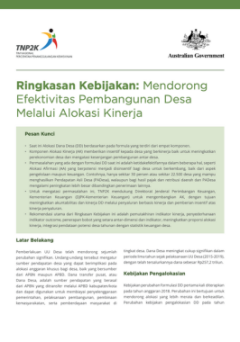
Ringkasan Kebijakan: Mendorong Efektivitas Pembangunan Desa Melalui Alokasi K…
Pemberlakuan UU Desa telah mendorong sejumlah perubahan signifikan. Undang-undang tersebut mengatur sumber pendapatan desa yang dapat berimplikasi pada alokasi anggaran khusus bagi desa, baik yang bersumber dari APBN maupun APBD. Dana transfer pusat, atau Dana Desa, adalah sumber pendapatan yang berasal dari APBN yang ditransfer melalui APBD kabupaten/kota dan dapat digunakan untuk membiayai pe…
- Edisi
- -
- ISBN/ISSN
- -
- Deskripsi Fisik
- PDF, 12 Halaman
- Judul Seri
- Policy Brief
- No. Panggil
- 352.54 ADJ.R
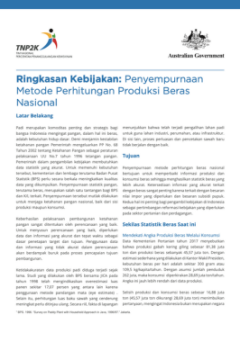
Ringkasan Kebijakan: Penyempurnaan Metode Perhitungan Produksi Beras Nasional
Padi merupakan komoditas penting dan strategis bagi bangsa Indonesia mengingat pangan, dalam hal ini beras, adalah kebutuhan hidup dasar. Demi menjamin kestabilan ketahanan pangan Pemerintah mengeluarkan PP No. 68 Tahun 2002 tentang Ketahanan Pangan sebagai peraturan pelaksanaan UU No.7 tahun 1996 tetangan pangan. Pemerintah dalam pengambilan kebijakan membutuhkan data statistik yang akurat. Un…
- Edisi
- -
- ISBN/ISSN
- -
- Deskripsi Fisik
- PDF, 8 Halaman
- Judul Seri
- Policy Brief
- No. Panggil
- 363.8 ADJ.R
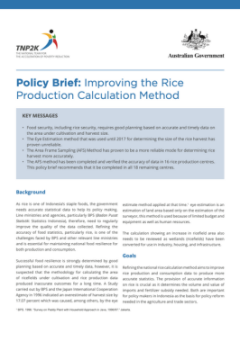
Policy Brief: Improving the Rice Production Calculation Method
As rice is one of Indonesia’s staple foods, the government needs accurate statistical data to help its policy making. Line ministries and agencies, particularly BPS (Badan Pusat Statistik: Statistics Indonesia), therefore, need to regularly improve the quality of the data collected. Refining the accuracy of food statistics, particularly rice, is one of the challenges faced by BPS and other re…
- Edisi
- 1
- ISBN/ISSN
- -
- Deskripsi Fisik
- PDF,
- Judul Seri
- PDF, 6 Halaman
- No. Panggil
- 363.8
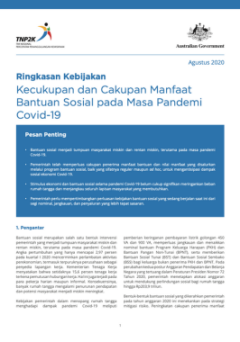
Ringkasan Kebijakan Kecukupan dan Cakupan Manfaat Bantuan Sosial pada Masa Pa…
Bantuan sosial merupakan salah satu bentuk intervensi pemerintah yang menjadi tumpuan masyarakat miskin dan rentan miskin, terutama pada masa pandemi Covid-19. Angka pertumbuhan yang hanya mencapai 2,97 persen pada kuartal I 2020 mencerminkan perlambatan aktivitas perekonomian, termasuk terpuruknya perusahaan sebagai penyedia lapangan kerja. Kementerian Tenaga Kerja menyatakan bahwa setidaknya …
- Edisi
- 1
- ISBN/ISSN
- -
- Deskripsi Fisik
- PDF, 12 Halaman
- Judul Seri
- Policy Brief
- No. Panggil
- 363.8 ASM.R
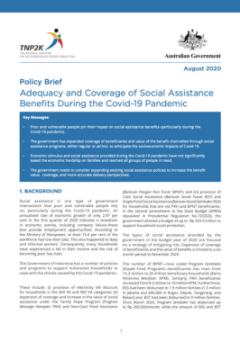
Policy Brief Adequacy and Coverage of Social Assistance Benefits During the …
Social assistance is one type of government intervention that poor and vulnerable people rely on, particularly during the Covid-19 pandemic. An annualised rate of economic growth of only 2.97 per cent in the first quarter of 2020 indicates a slowdown in economic activity, including company failure–those that provide employment opportunities. According to the Ministry of Manpower, at least 15.…
- Edisi
- 1
- ISBN/ISSN
- -
- Deskripsi Fisik
- PDF, 12 Halaman
- Judul Seri
- Policy Brief
- No. Panggil
- 363.8 ASM.P
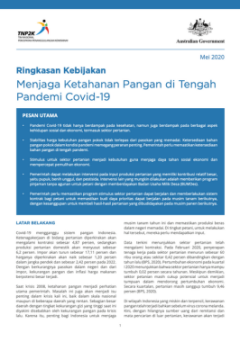
Ringkasan Kebijakan Menjaga Ketahanan Pangan di Tengah Pandemi Covid-19
Covid-19 mengganggu sistem pangan Indonesia. Ketenagakerjaan di bidang pertanian diperkirakan akan mengalami kontraksi sebesar 4,87 persen, sedangkan produksi pertanian domestik akan menyusut sebesar 6,2 persen. Impor akan turun sebesar 17,11 persen dan harganya diperkirakan akan naik sebesar 1,20 persen dalam jangka pendek dan sebesar 2,42 persen pada 2022. Dengan berkurangnya pasokan dalam ne…
- Edisi
- 1
- ISBN/ISSN
- -
- Deskripsi Fisik
- PDF, 8 Halaman
- Judul Seri
- Policy Brief
- No. Panggil
- 363.8 ASM.R
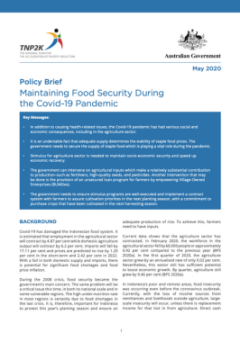
Policy Brief Maintaining Food Security During the Covid-19 Pandemic
Covid-19 has damaged the Indonesian food system. It is estimated that employment in the agricultural sector will contract by 4.87 per cent while domestic agriculture output will contract by 6.2 per cent. Imports will fall by 17.11 per cent and prices are predicted to rise by 1.20 per cent in the short-term and 2.42 per cent in 2022. With a fall in both domestic supply and imports, there is pote…
- Edisi
- 1
- ISBN/ISSN
- -
- Deskripsi Fisik
- PDF, 12 Halaman
- Judul Seri
- Policy Brief
- No. Panggil
- 363.8 ASM.P
 Karya Umum
Karya Umum  Filsafat
Filsafat  Agama
Agama  Ilmu-ilmu Sosial
Ilmu-ilmu Sosial  Bahasa
Bahasa  Ilmu-ilmu Murni
Ilmu-ilmu Murni  Ilmu-ilmu Terapan
Ilmu-ilmu Terapan  Kesenian, Hiburan, dan Olahraga
Kesenian, Hiburan, dan Olahraga  Kesusastraan
Kesusastraan  Geografi dan Sejarah
Geografi dan Sejarah